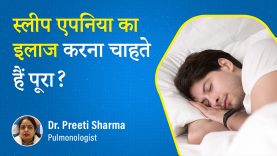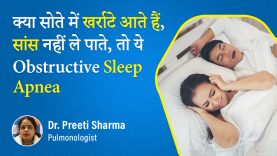Obstructive Sleep Apnea(ऑब्स्ट्रक्टिव स्लीप एपनिया): Symptoms, Causes & Risk Factors
- 1.47K
- 3 years ago
Dr. Preeti Sharma
Dr. Preeti Sharma
Obstructive Sleep Apnea(ऑब्स्ट्रक्टिव स्लीप एपनिया): Symptoms, Causes & Risk Factors
In this video SimpliHealth expert Pulmonologist, Dr. Preeti Sharma is talking about Obstructive Sleep Apnea(ऑब्स्ट्रक्टिव स्लीप एपनिया) and also she is answering some questions that people ask like:
- What is OSA?
- What are its symptoms?
- How will we know that we have OSA?
What is Obstructive Sleep Apnea(ऑब्स्ट्रक्टिव स्लीप एपनिया)?
Obstructive sleep apnea is an upper airways disease in which our breathing stops for a short period of time. Sometimes this can be a 10 seconds gap. One can’t feel it when they are asleep. The upper airways muscles relax when we are sleeping.. While lying down if there is a blockage here, then the tongue fall can result in loud snoring. But people say snoring is normal, eveyone does it.
So what is wrong with it? There is a lot of difference between regular snoring and snoring due to this.
Obstructive sleep apnea causes: How can experts find out this? Or स्लीप एपनिया के कारण
According to our experts in sleep apnea, apnea means there is shortness of breath for a short while, and for a short period, the oxygen flow to the body and its supply to body organs is reduced. So this is called sleep apnea. It is divided into two types: central and obstructive sleep apnea. The brain doesn’t signal to breathe, which is associated with neurological reasons in central sleep apnea. In OSA, there is an obstruction due to which breathing is difficult.
What are the risk factors associated with sleep apnea?
Obstructive sleep apnea is more common in males commonly found in age groups above 40, and most importantly, it is because of obesity. The chances of having OSA is the measured circumference of the neck in males is more than 17 inches and above 15 inches in females. There are a few other factors like craniofacial deformities, a large tongue, and small nose airways. In addition, whenever you lie down, there is a blockage in the airway resulting in shortness of breath. Apart from this, there may be some underlying medical factors like diabetes or hypertension, so you have a better chance of having OSA.
Obstructive Sleep Apnea Symptoms: How will we know that we have this?
Suppose you have high-pitched snoring during the night while sleeping. You experience a headache after waking up after an afternoon nap. you experience dry mouth, or you feel laziness after waking up. One may feel like they didn’t sleep, or they can’t sleep at night, may have a feeling of tiredness during the day, loss of concentration at work. Some may have choking spells like many times those who slept with them at night tell that they wake up suddenly and feel like someone has stifled their neck or you wake up often at night to pass urine. So if you are having any of these symptoms, you must visit your sleep specialist and get screening for OSA; for diagnosis, doctors perform different tests through which doctors come to know that you have obstructive sleep apnea or not. Further, get it treated.















Comments (0)